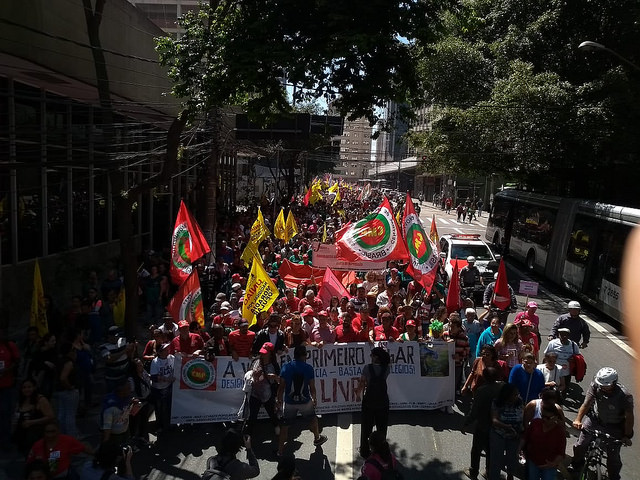Cry of the Excluded denounces violence, cost of living, and Lula’s prison in Brazil

Leia em português | Leer en español
On the day we remember the declaration of independence of Brazil, the Cry of the Excluded also stages demonstrations all over the country. The protest happens every year and was first conceived by pastoral commissions and people’s movements.
There is a reason why the demonstration happens on Sep. 7: it’s an invitation for those who are taken over by feelings of patriotism to discuss how to build a more democratic, less unequal nation.
“The fact that people’s movements take to the streets on the 7th to express their outcry and political, cultural, and social clamors is also a way to turn bystanders into protagonists on the streets, presenting demands to the people who don’t usually enjoy rights,” said José Carlos Pereira, from the Center of Migration Studies and an activist who participates in the Cry of the Excluded.
The annual protest started in 1995 and every year it has a different theme. Marches, demonstrations, seminars, classes, and talks take place in capital cities all over the country throughout the week.
In 2018, the banner of the 24th Cry of the Excluded is “Inequality leads to Violence: No More Privilege.”
Pereira explains the theme was decided because of today’s political climate in Brazil, as the country is experiencing the impacts of the 2016 coup and social setbacks.
Brasília
In Brasília, the capital city of Brazil, the demonstration took place across from the official Independence Day Parade.
Arlete Sampaio (PT), a former vice governor of the Federal District, said the true meaning of independence is people’s sovereignty, and not a pretense of patriotism that is actually overlooking national patrimony.
“They wear the country’s colors while destroying the independence of Brazil, destroying sovereignty, handing over our wealth to financial capital that does nothing but exploit us. They are not true Brazilians. They don’t have the right to claim our colors. We do. We have to make Lula or someone that represents him win the election again in this country,” she said.
Sueli Bellato, from the Peace and Justice Commission, took part in the demonstration in Brasília and spoke about yesterday’s attack against far-right presidential candidate Jair Bolsonaro, lamenting the episode.
“Unfortunately, violence leads to violence. Peace brings peace. May he recover as quickly as possible. And may he change his views, because we also lamented when Lula’s caravan was attacked by shooters in the South[of Brazil]. Violence will not make us a better nation,” she said.
São Paulo
In São Paulo, people’s movements, pastoral commissions, unions, and left-wing parties took to the street to hold a people’s parade.
The movements released a statement criticizing the labor reform and the increase of vulnerable employment, unemployment, and cost of living; and the public spending freeze.
The national coordinator of the Center of People’s Movement (CMP), Raimundo Bonfim, said the increase of political violence in the country is also a reflection of increasing inequality, echoing in attacks such as the one Bolsonaro and former president Lula suffered.
“It’s a catastrophic outcome, a tragedy the country has been living from an economic and social point of view,” Bonfim said. “We are sorry and reject [the attack on the far-right candidate], but we have to say that, unfortunately, he increased this climate of violence and intolerance that makes this kind of act possible.”
The end of brutality against black people was also a topic for the Cry of the Excluded. Priestess Solange Machado took part in the demonstration in São Paulo and said black people are underrepresented in politics. “We are not represented in the spaces of power and decision-making. We remain excluded from our right to be acknowledged and have access to decent health and education.”
“Here we also have housing, landless, unemployed workers, women, LGBT movements, and others, as well as members of groups who are excluded from what society labels as worthy of rights,” Machado said.
The demonstration also called for the release of ex-president Lula, who has been held at the Federal Police headquarters since Apr. 7.
* With reports by Luciana Console, Rafael Tatemoto, and Rute Pina
Edition: Diego Sartorato and Juca Guimarães | Translated by Aline Scátola
